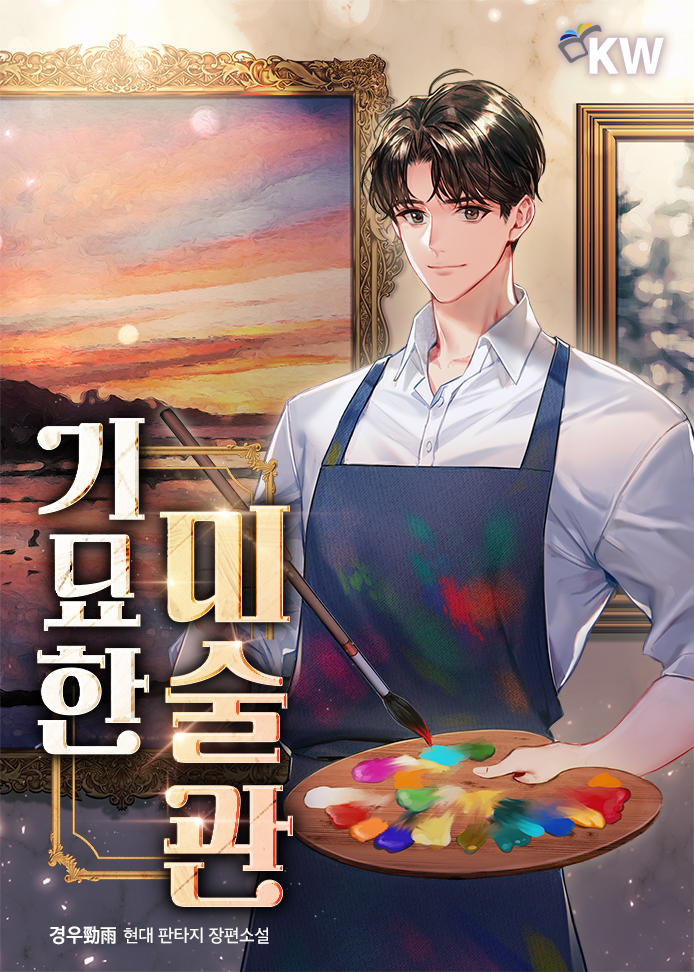Beethoven Frieze (3)
Staring at his work, Klimt opens his mouth.
"Hoffman."
"Yes."
"This painting will also receive harsh criticism from critics and commentators, won't it?"
"............"
As Hoffman struggles to respond, Klimt smiles.
"Isn't that true? Even now, most critics say Klimt is nothing but a cheap salesman, dazzling people with his flamboyant decorative effects and gold, a symbol of capitalism."
Hoffman speaks with a stern face.
"It's rather the critics and commentators who scribble garbage, seeking to gather attention and make money. You're definitely not one of those people."
Klimt raises his index finger, smiling.
"In Klimt's paintings, there is no tradition, no artistry, no cultural conservatism. He's just a lowly painter who denies academism, blasphemes against God, and indulges in vulgar eroticism. That's how I'm being evaluated."
"............"
"But isn't it funny? Despite such evaluations, people still line up all year round to commission paintings from me, and my pockets are getting fuller. Ironically, while I don't conform to the times, the times still want me."
"Hmm."
Klimt, with his arms crossed, walks around the painting and says,
"A critic once said that Klimt draws mosaic art with ornate gold because his father was a goldsmith."
Looking up at the golden parts of his painting, Klimt speaks,
"As you know, my style has changed significantly. Do you know since when?"
"I'm not sure."
"From right now. Before painting this, I didn't use much gold, mindful of the critics. But in this painting, I've used a lot of gold."
"That's impressive."
I listened to their conversation while looking at the painting.
After painting this, Klimt went on one of his few trips in life. In 1903, during his trip to Italy, he saw the Byzantine style mosaics in the Basilica of San Vitale in Ravenna.
He was deeply impressed by the mosaics in the triforium above the church's arched windows, depicting stories of sacrifice from the Old Testament, such as Abraham and Melchizedek, and the Sacrifice of Isaac. From then on, Klimt began to conceptualize paintings with a golden mosaic effect, which led to his golden era, including the famous 'The Kiss'.
Klimt, again with arms crossed, says,
"After this exhibition, I plan to travel."
"I thought you didn't like traveling."
"That's true, but what do you think is the most important thing a painter should do well?"
"Isn't it painting?"
"No, simply painting can be done by anyone. What a painter should really excel at is the act of seeing. Even if you look at the same thing and paint the same picture, how you perceive the subject can result in entirely different paintings."
"So you're traveling for study. Where are you going?"
"To Italy. To the Eastern Roman Empire, where the Byzantine Empire, which fell in just 53 days, was located."
Klimt smiles at Hoffman.
"People describe my paintings as merely decorative trash. So, I decided to go to the Eastern Roman. To learn about the incredibly ornate culture and art of the Byzantine era. If they say I'm ornate, I'll show them even more ornateness."
Hoffman claps and laughs softly.
"That's so like you, haha."
Klimt looks at his painting again and speaks,
"The critics' saying that a great artist must be hungry has turned the pursuit of profit by artists into something wrong. Consequently, a prejudice has emerged that the commercial nature of popular culture hinders the development of culture and art."
Hoffman agrees.
"The error of confusing longing for art with aversion to mainstream culture is a staple in cultural criticism."
Klimt nods and continues,
"The purpose of creative activity should not be dictated by intellectuals' definitions. Artists cannot be castrated according to some arbitrary imperatives declared by critics."
"That's right."
Klimt smiles at his painting.
"Comics are lowly? I assure you, the quality of popular culture will draw an upward curve over time. If art remains complacent in reality, it will fall behind popular culture. Maybe in about 100 years, our children will read more comic magazines than visit art galleries." [T/N: Ahem.]
**
With a jolt, I emerge from the dream.
Still in the midst of majestic music, sitting alone in a vast space, I shake my head vigorously, trying to hold onto the fading thread of consciousness.
Everything Klimt said in the dream was right.
And he predicted modern society as if he had seen the future.
Ask any student you meet on the street.
Who painted the lunch on the grass?
How many would answer Édouard Manet?
But if you ask who wrote Dragon Ball, Some might know the name of the Japanese manga artist. [T/N: Ahem. Ahem.]
Those who know the creators of "Dooly the Little Dinosaur" and "Fly Superboard" might outnumber those who know Edgar Degas by 60% in our society.
Indeed, society has flowed just as Klimt said.
The preference for popular culture and the perceived decline in the progression of art is not a misstep.
The moment artists chose to embrace a critical view of capitalism and a wariness of commercialism as their mission, they chose their own stagnation.
As Klimt said, modern popular culture increasingly provides opportunities for more people to consume culture.
The famous comedian Charlie Chaplin said,
“I started this job to make money, but from there, art was born.”
Read ahead by supporting me on Ko-fi. Access 5 advance chapters with the Doddle Dabbler Tier ($8) or 10 advance chapters with Artist Apprentice Tier ($15) or 20 advance chapters with Master Artisan Tier ($25) For every $15 collected on Ko-fi, I will release an extra chapter. Choose your tier by clicking the 'Support me' button! Rate and review this novel on NU to help people find this novel. Bonus chapters on reaching milestones. Happy reading!

